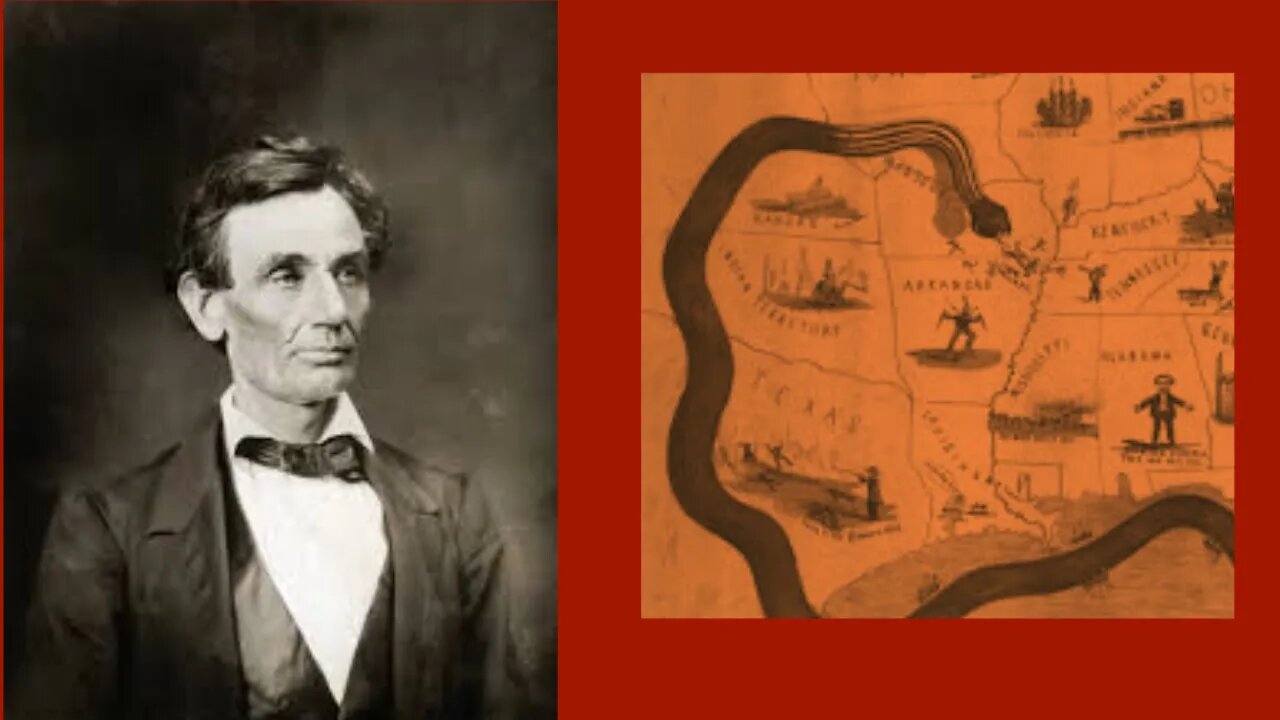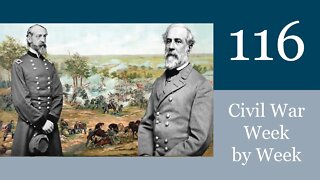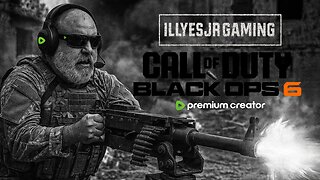Premium Only Content

Civil War Week By Week: 3. My anaconda don't want none (April 26th - May 2nd)
The first month is over as the three month war grows bigger.
Script:
The civil war up to now is no more than a small conflict but even a small conflict the law must be amended
On the 27th President Lincoln suspended Habeas Corpus, it will not be reinstated until 1866. This will allow him to arrest people he deems to be working against America during the Civil War. He will get mass criticism for this throughout his presidency. Also on the 27th Lincoln expanded the blockade to North Carolina and Virginia, remember North Carolina is still an American state. Here is where I will talk about this blockade suggested by Commander in Chief of the U.S forces Winfield Scott. It is well known as the Anaconda plan because of the idea to strangle the Confederacy to death much like the Anaconda does to people and animals. This would be done by using the navy to make sure no ships leave, taking over islands off the coasts and sending an army of 60,000 using gunboats down the Mississippi river. By taking over the river ways, ports and important trading cities such as New Orleans, the war could be won. But why such a caustios plan? First Scott had only a limited amount of regulars with the 75,000 being untrained, ill equipped and untrustworthy at least to him. Also the lack of blood would make it easier for the Southern states to more easily be reconciled. As he put it “Envelope the insurgent states and bring them to terms with less bloodshed.” While this does sound pretty good there's one problem, morale. The American politicians and press didn’t want a long drawn out war and they could easily win so why wait. Scott knew this and wrote as such to a subordinate of his McCellan another name that will be more important later. He says, “The greatest obstacle in the way of this plan the impatience of our patriotic and loyal friends.” Scott is correct and his plan will be dropped, but mostly in name. The blockade along with fighting down the Mississippi river will be done. So maybe his idea was correct after all.
Unfortunately there seems to be no other noteworthy events this week
While this might mean I have nothing to talk about that isn’t strictly true. During war even when nothing is happening there's still much to say. So let’s talk about Uniforms and logistics. First logistics the arming, resupplying and reinforcing of armed forces. This will be the first railroad war, and as the name implies trains and railroads will be important. The Union had a much better railroad system being more industrialized, while the Confederacy not so much. There are few railroads and they are quite fragile. A bigger problem railroads were mostly not part of a system. They would start and stop at just random towns. The importance of the railroad is not lost on historians with some saying the war could have been shortened by years if not for southern raiders. The naval logistics was even harder for the confederacy. The blockade cut off major movement of supplies. The Mississippi, an important river network, was soon to have numerous union gunboat patrols. They would also have to start one from scratch. The union navy despite being under supplied and unmanned would have a much easier time supplying and reinforcing armies allowing later for a certain general to go behind enemy lines on the peninsula of Virginia. How about production, another thing of Confederate disadvantage. First, uniforms the North had many textile factories and despite early problems would soon be able to find a uniform design that could be mass produced at amazing speeds. The confederacy while having the famous Rebel Grey uniforms were in reality very diverse in designs. This is because the supply and outfitting of the soldiers was a responsibility held by the individual states. In fact after victories Union uniforms were taken and worn by the Confederacy.
Next week please join me as I talk about how the war actually continued. See you then.
-
 4:42
4:42
CivilWarWeekByWeek
3 years agoCivil War Week By Week Episode 116. Death of America? (June 26th - 30th 1863)
19 -
 0:16
0:16
donald233
3 years agodon't want to wake up cat
3 -
 38:47
38:47
MattMorseTV
5 hours ago $1.10 earned🔴Tulsi just CLEANED HOUSE.🔴
43.7K81 -
 LIVE
LIVE
Reolock
6 hours agoWoW Classic Hardcore | WE'RE BACK!!
197 watching -
 3:46:13
3:46:13
SynthTrax & DJ Cheezus Livestreams
8 hours agoShell Shock Live - The Scorched Earth Remake/Upgrade - 4pm PST / 7pm EST - RUMBLE GAMING
34.4K -
 2:56:57
2:56:57
Illyes Jr Gaming
4 hours agoBack to Black .....Ops 6 w/ ILLYESJRGAMING
21.3K1 -
 1:07:59
1:07:59
BonginoReport
7 hours agoBoston Mayor Defies Trump, Protects Illegals - Nightly Scroll w/ Hayley Caronia (Ep.115)
121K83 -
 40:45
40:45
Donald Trump Jr.
8 hours agoPeace by Peace: Solving One Problem After Another | Triggered Ep.268
69K62 -
 5:19:04
5:19:04
FrizzleMcDizzle
5 hours ago $1.33 earnedRemnant 2 - Dark Souls-like Shooter?!
20.9K -
 LIVE
LIVE
FoeDubb
3 hours ago🏰KINGDOM MENU: 🎮DELTA FORCE PEW PEWS WITH THE BROS 👑CRGOODWiN & 👑BSPARKSGAMING DILLY DILLY!!
16 watching